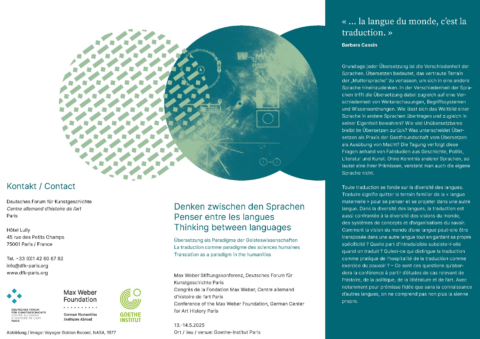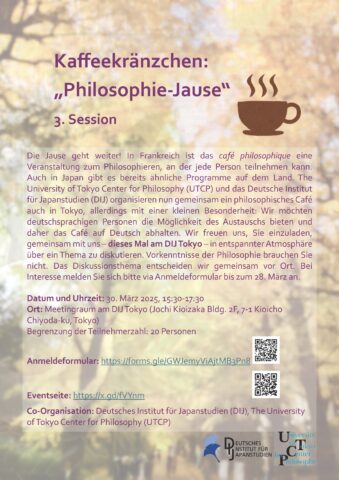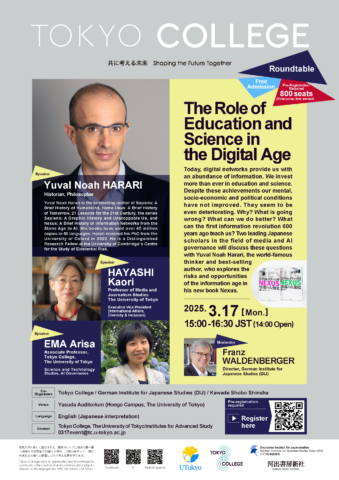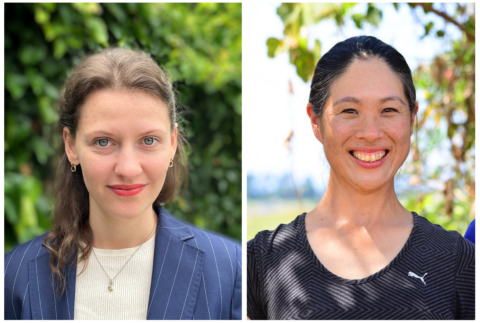Events and Activities
DIJ researchers at MWS Conference ‘Thinking between languages’
 DIJ researcher Nicole M. Mueller and DIJ director Franz Waldenberger will participate in this year’s foundation conference on the theme ‘Thinking between languages’ organised by the German Center for Art History Paris (DFK Paris) and the Max Weber Stiftung (MWS). Nicole Mueller will give a presentation on “Japan’s Translation Culture between Innovation and Subordination. Retraced through 15 Retranslations of Thomas Mann’s Tonio Kröger“, based on her research project Thomas Mann’s reception in Japan between cultural heteronomy and emancipatory impulses. Franz Waldenberger will be a panelist in the final discussion on ‘Simultaneous Interpretations: The Max Weber Institutes as Translators of Languages, (Academic) Cultures, Methodologies, and More’. The conference takes place at the Goethe-Institute Paris on May 13 and 14. Details here
DIJ researcher Nicole M. Mueller and DIJ director Franz Waldenberger will participate in this year’s foundation conference on the theme ‘Thinking between languages’ organised by the German Center for Art History Paris (DFK Paris) and the Max Weber Stiftung (MWS). Nicole Mueller will give a presentation on “Japan’s Translation Culture between Innovation and Subordination. Retraced through 15 Retranslations of Thomas Mann’s Tonio Kröger“, based on her research project Thomas Mann’s reception in Japan between cultural heteronomy and emancipatory impulses. Franz Waldenberger will be a panelist in the final discussion on ‘Simultaneous Interpretations: The Max Weber Institutes as Translators of Languages, (Academic) Cultures, Methodologies, and More’. The conference takes place at the Goethe-Institute Paris on May 13 and 14. Details here
Hybrid DIJ Study Group on Death and the Cat in Japanese Folklore

As in many cultures, the imagery of the cat in Japan is highly ambiguous: it is marked both as protective kami and ferocious yôkai that haunts the house and kills its owners to take on their shape. But Japan’s felines are also viewed as necromancers, soul stealers, body snatchers. This presentation will take a closer look at the cat’s strong association with death through the lens of the Kasha, a former Buddhist demon that took on the shape of a supernatural cat during the late 17th/early 18th century. Together with the well-known story complex of the “Neko danka” (Cat Parishioner) the motif of the body-snatching Kasha will serve as an example of how cats appear in the popular culture of the Edo period as a representation of Japanese folklore. Details and registration here
Hybrid DIJ Forum on German and Japanese Economies
 A rapidly ageing population, global warming, digitalization and AI, heightened geopolitical risks and a U.S.-induced tariff war – entering 2025, the German and Japanese economies confront an increasingly challenging as well as uncertain economic environment. How do they confront the fundamental domestic and international challenges? What possible scenarios do they envisage? These and related questions will be addressed by two leading economic scholars, Monika Schnitzer (German Council of Economic Experts) and Noriyuki Yanagawa (Council on Economic and Fiscal Policy). Their input statements will be followed by comments from two Japanese corporate leaders, Osamu Mogi (Kikkoman Corporation) and Makoto Shiono (Industrial Growth Platform) before the floor will be opened to questions from the general audience. The event will be held in English, admission is free. It is co-organised with Japan Association of Corporate Executives and will be followed by a small reception. Details and registration here
A rapidly ageing population, global warming, digitalization and AI, heightened geopolitical risks and a U.S.-induced tariff war – entering 2025, the German and Japanese economies confront an increasingly challenging as well as uncertain economic environment. How do they confront the fundamental domestic and international challenges? What possible scenarios do they envisage? These and related questions will be addressed by two leading economic scholars, Monika Schnitzer (German Council of Economic Experts) and Noriyuki Yanagawa (Council on Economic and Fiscal Policy). Their input statements will be followed by comments from two Japanese corporate leaders, Osamu Mogi (Kikkoman Corporation) and Makoto Shiono (Industrial Growth Platform) before the floor will be opened to questions from the general audience. The event will be held in English, admission is free. It is co-organised with Japan Association of Corporate Executives and will be followed by a small reception. Details and registration here
Noriyuki Yanagawa, Council on Economic and Fiscal Policy
Deutschsprachiges Kaffeekränzchen „Philosophie-Jause“
 Die Jause geht weiter! In Frankreich ist das café philosophique eine Veranstaltung zum Philosophieren, an der jede Person teilnehmen kann. Auch in Japan gibt es bereits ähnliche Programme auf dem Land. The University of Tokyo Center for Philosophy (UTCP) und das Deutsche Institut für Japanstudien (DIJ) organisieren nun gemeinsam ein philosophisches Café auch in Tokyo, allerdings mit einer kleinen Besonderheit: Wir möchten deutschsprachigen Personen die Möglichkeit des Austauschs bieten und daher das Café auf Deutsch abhalten. Das Organisationsteam (Yukiko Kuwayama, UTCP und Sebastian Polak-Rottmann, DIJ) freut sich, Sie einzuladen, gemeinsam in entspannter Atmosphäre über ein Thema zu diskutieren. Fachliche Vorkenntnisse benötigen Sie nicht. Das Diskussionsthema entscheiden wir gemeinsam vor Ort. Bei Interesse melden Sie sich bitte bis zum 28. März an. Weitere Informationen hier
Die Jause geht weiter! In Frankreich ist das café philosophique eine Veranstaltung zum Philosophieren, an der jede Person teilnehmen kann. Auch in Japan gibt es bereits ähnliche Programme auf dem Land. The University of Tokyo Center for Philosophy (UTCP) und das Deutsche Institut für Japanstudien (DIJ) organisieren nun gemeinsam ein philosophisches Café auch in Tokyo, allerdings mit einer kleinen Besonderheit: Wir möchten deutschsprachigen Personen die Möglichkeit des Austauschs bieten und daher das Café auf Deutsch abhalten. Das Organisationsteam (Yukiko Kuwayama, UTCP und Sebastian Polak-Rottmann, DIJ) freut sich, Sie einzuladen, gemeinsam in entspannter Atmosphäre über ein Thema zu diskutieren. Fachliche Vorkenntnisse benötigen Sie nicht. Das Diskussionsthema entscheiden wir gemeinsam vor Ort. Bei Interesse melden Sie sich bitte bis zum 28. März an. Weitere Informationen hier
Hybrid DIJ Study Group on the lived experiences of multilinguals in Japan
 Japan is experiencing a growing influx of international migrants. These individuals establish new social connections in both their private and professional lives, which often involves learning Japanese. However, Japanese is just one resource within a broader, multilingual repertoire. This presentation explores the lived experiences of multilingual individuals in Japan, focusing on two spheres that typically require distinct sets of communicative competences: romantic relationships and workplaces. Drawing on data from narrative interviews, our speaker will demonstrate how multilinguals rationalize their interactional partners’ behavior and attribute intentional states to them to make sense of their experiences and their implications for perceptions of language competence. He will argue that competence should be understood as an intersubjective capability that emerges in interactions between individuals, across time and spaces, and institutional contexts, all while being intertwined with emotional expressions. Details and registration here
Japan is experiencing a growing influx of international migrants. These individuals establish new social connections in both their private and professional lives, which often involves learning Japanese. However, Japanese is just one resource within a broader, multilingual repertoire. This presentation explores the lived experiences of multilingual individuals in Japan, focusing on two spheres that typically require distinct sets of communicative competences: romantic relationships and workplaces. Drawing on data from narrative interviews, our speaker will demonstrate how multilinguals rationalize their interactional partners’ behavior and attribute intentional states to them to make sense of their experiences and their implications for perceptions of language competence. He will argue that competence should be understood as an intersubjective capability that emerges in interactions between individuals, across time and spaces, and institutional contexts, all while being intertwined with emotional expressions. Details and registration here
Roundtable discussion with Yuval Noah Harari on education and science in the digital age
 Today, digital networks provide us with an abundance of information. We invest more than ever in education and science. Despite these achievements our mental, socio-economic and political conditions have not improved. They seem to be even deteriorating. Why? What is going wrong? What can we do better? What can the first information revolution 600 years ago teach us? Two leading Japanese scholars in the field of media and AI governance will discuss these questions with Yuval Noah Harari, the world-famous thinker and best-selling author, who explores the risks and opportunities of the information age in his new book Nexus. The event will be held in English with Japanese interpretation, admission is free. It is co-organised by the DIJ, Tokyo College, and Kawade Shobo Shinsha on the occasion of the publication of the Japanese version of Yuval Noah Harari’s book Nexus. Please note that this event is fully booked. Details here
Today, digital networks provide us with an abundance of information. We invest more than ever in education and science. Despite these achievements our mental, socio-economic and political conditions have not improved. They seem to be even deteriorating. Why? What is going wrong? What can we do better? What can the first information revolution 600 years ago teach us? Two leading Japanese scholars in the field of media and AI governance will discuss these questions with Yuval Noah Harari, the world-famous thinker and best-selling author, who explores the risks and opportunities of the information age in his new book Nexus. The event will be held in English with Japanese interpretation, admission is free. It is co-organised by the DIJ, Tokyo College, and Kawade Shobo Shinsha on the occasion of the publication of the Japanese version of Yuval Noah Harari’s book Nexus. Please note that this event is fully booked. Details here
Kaori Hayashi, University of Tokyo
Arisa Ema, Tokyo College
Online DIJ Study Group on Generative AI and the Question of Authorship

Whether in Japan or elsewhere, the creation of books has never been an individual endeavor. The AI boom following the public release of ChatGPT in November 2022 sparked debates on the ethical use of generative tools and copyright issues. At the same time, however, it also prompted a reconsideration of the inherent fluidity of authorship as a concept in both arts and literature. This presentation examines how authorship is negotiated in contemporary Japanese literature in the context of AI. Focusing on several case studies it argues that each of them demonstrates how the notion of who (and what) can be an “author” has been gradually expanding over the past decades. Details and registration here
Hybrid DIJ Forum on Sustainable Food Practices in Japan
 This DIJ Forum combines approaches to sustainable food practices of two different worlds within Japan. The urban landscape of Japanese cities—embodied in Shibuya’s bustling streets and iconic food vending machines—adopts an accelerated pace, catering to the fast schedules of modern Japanese life. Sustainability scholar Patricia Hein discusses Japanese approaches to food rhythms and uncovers how temporality influences sustainability practices through interviews with chefs, founders, vendors, and consumers. Farmer and local activist Eri Ōtsu shifts the focus to sustainable food production in rural Kumamoto. She illustrates the challenges and achievements of running an organic farm in rural Japan and demonstrates the possibilities of a sustainable lifestyle in Japan’s depopulating areas. Both speakers show how food is deeply tied to time, place, and seasonality in two different regions within the country. The event will be held in English, admission is free. The presentations will be followed by a Q&A session and a small reception. Details and registration here
This DIJ Forum combines approaches to sustainable food practices of two different worlds within Japan. The urban landscape of Japanese cities—embodied in Shibuya’s bustling streets and iconic food vending machines—adopts an accelerated pace, catering to the fast schedules of modern Japanese life. Sustainability scholar Patricia Hein discusses Japanese approaches to food rhythms and uncovers how temporality influences sustainability practices through interviews with chefs, founders, vendors, and consumers. Farmer and local activist Eri Ōtsu shifts the focus to sustainable food production in rural Kumamoto. She illustrates the challenges and achievements of running an organic farm in rural Japan and demonstrates the possibilities of a sustainable lifestyle in Japan’s depopulating areas. Both speakers show how food is deeply tied to time, place, and seasonality in two different regions within the country. The event will be held in English, admission is free. The presentations will be followed by a Q&A session and a small reception. Details and registration here
Eri Ōtsu, O2 Farm (Minamiaso, Kumamoto)



 Open Access
Open Access
